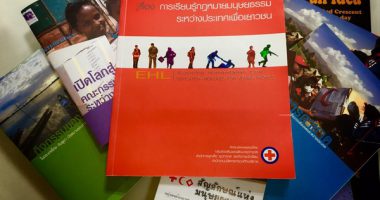หลังจากที่เราได้อ่านบทสัมภาษณ์ของน้องนักศึกษาจากทีมไทยและทีมกัมพูชากันไปแล้ว วันนี้เราจะไปทำความรู้จักกับน้องเทพมาลา สะเด็ดตัน หนึ่งในผู้ชนะการแข่งขันศาลจำลองในกฎหมายมนุษยธรรมระหว่างประเทศ รอบคัดเลือกตัวแทนประเทศจากสปป ลาว ว่าทำไมจึงเข้าร่วมการแข่งขันครั้งนี้และทีมจากสปป.ลาว มีการเตรียมตัวอย่างไรกับการแข่งขันในระดับนานาชาติที่กำลังจะมาถึงที่เขตปกครองพิเศษฮ่องกงในเดือนมีนาคม 2560 กันบ้าง
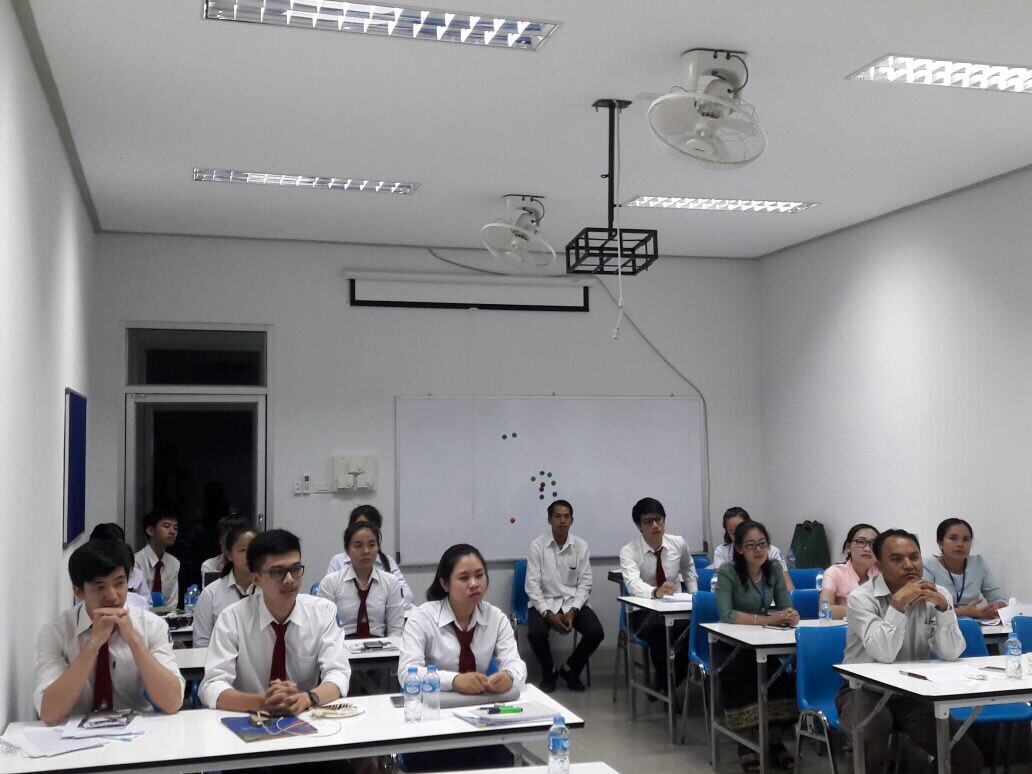
น้องๆนักศึกษาจากมหาวิทยาลัยแห่งชาติลาวเข้าชมการแข่งขันศาลจำลองในกฎหมายมนุษยธรรมระหว่างประเทศซึ่งจัดขึ้นเป็นปีที่ 2 ติดต่อกัน
ICRC-น้องช่วยแนะนำตัวหน่อยค่ะ
เทพมาลา- ดิฉันชื่อเทพมาลา สะเด็ดตันค่ะ เป็นนักศึกษาชั้นปีที่ 4 เอกความสัมพันธ์ระหว่างประเทศ คณะกฎหมายและรัฐศาสตร์ มหาวิทยาลัยแห่งชาติลาวค่ะ
ICRC-น้องเทพมาลาทราบข่าวเกี่ยวกับการแข่งขันศาลจำลองในกฎหมายมนุษยธรรมระหว่างประเทศ (International Humanitarian Law (IHL)) จากที่ไหนคะ
เทพมาลา-ดิฉันได้ยินเรื่องการแข่งขันรายการนี้มาจากอาจารย์ตั้งแต่ตอนเรียนอยู่ปี 2 ค่ะ จะมีประกาศติดชักชวนให้นักศึกษาไปสมัครกัน แต่ปีแรกดิฉันไม่ได้ลงสมัครเพราะไม่รู้ว่าการแข่งขันศาลจำลองคืออะไร ปีต่อมาติดตรงที่ว่าดิฉันลงสมัครโปรแกรมแลกเปลี่ยนนักศึกษาไว้ ในที่สุดก็ได้มาสมัครปีนี้ล่ะค่ะ ประสบการณ์จากสมาคมนักศึกษากฎหมายอาเซียน (ALSA) เป็นแรงบันดาลใจสำคัญที่ทำให้ดิฉันมายืนตรงจุดนี้เพราะจากการทำงานและการเฝ้าสังเกต ดิฉันพบว่านักศึกษาในคณะของดิฉันไม่มีความรู้เกี่ยวกับการแข่งขันศาลจำลองฯรวมถึงเรื่องกฎหมายมนุษยธรรมระหว่างประเทศมากนัก ดิฉันจึงอยากที่จะเข้าร่วมการแข่งขันรายการนี้เพื่อเป็นอีกหนึ่งแรงผลักดันให้เพื่อนๆและนักศึกษาคนอื่นๆรู้จักการแข่งขันและตัวกฎหมาย IHL ให้มากขึ้น
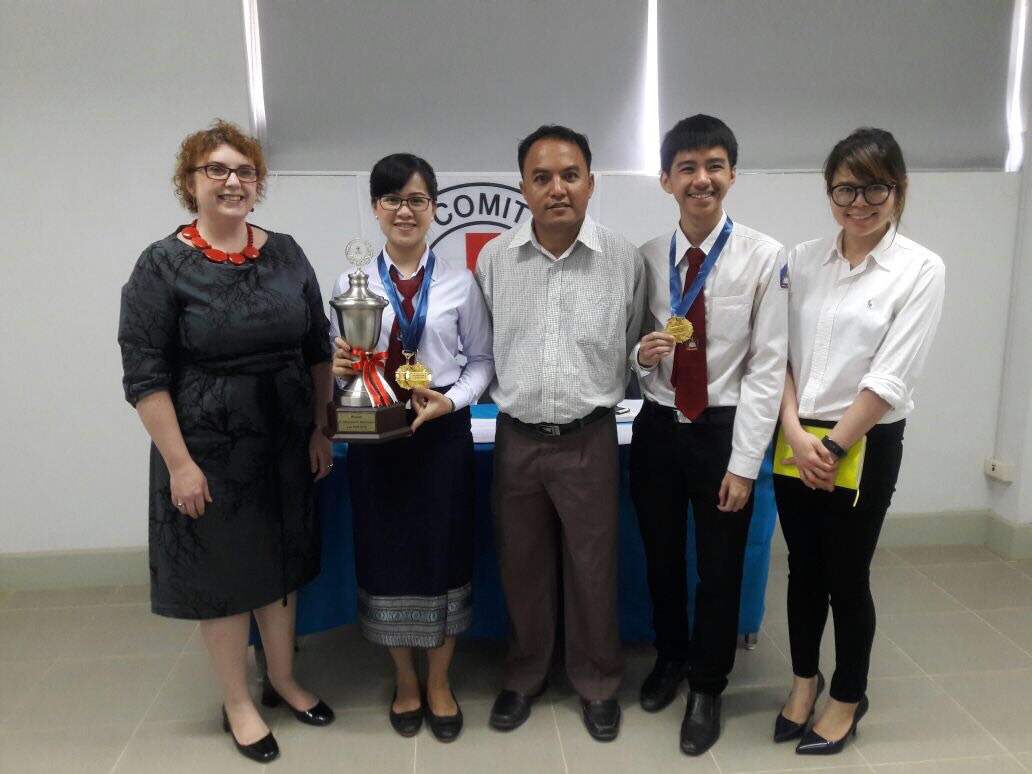
น้องเทพมาลา สะเด็ดตันและน้องทีละเดช สีวิไซย ผู้ชนะการแข่งขันศาลจำลองฯรอบคัดเลือกตัวแทนประเทศจากสปป ลาว. ถ่ายรูปคู่กับกรรมการตัดสินจาก ICRC และอาจารย์ที่ปรึกษา
ICRC-มีการเตรียมตัวสำหรับการแข่งขันอย่างไรบ้างคะ
เทพมาลา-ดิฉันหาสิ่งที่เกี่ยวข้องมาอ่านเพิ่มมากขึ้น พยายามทำความเข้าใจกับโจทย์ อ่านตัวกฎหมายที่เกี่ยวข้องและอ่านคำร้องจากทั้งฝ่ายโจทก์และจำเลยจากการแข่งขันครั้งก่อน นอกจากนั้นก็หาดูการแข่งขันศาลจำลองฯจากทางยูทูปเพื่อฝึกฝนการว่าความในศาลอย่างสม่ำเสมอค่ะ
ICRC-ปัจจุบันในสปป ลาว มีการเรียนการสอนเกี่ยวกับกฎหมายมนุษยธรรมมากน้อยแค่ไหนคะ
เทพมาลา-ลาวเป็นประเทศที่สงบไม่มีสงครามหรือการสู้รบและผู้คนทั่วไปก็ยังไม่ได้มีความรู้ในเรื่องกฎหมายมนุษยธรรมระหว่างประเทศมากนักเพราะส่วนใหญ่จะมีก็แต่สถาบันการศึกษาบางแห่งในประเทศเท่านั้นที่มีการเรียนการสอน
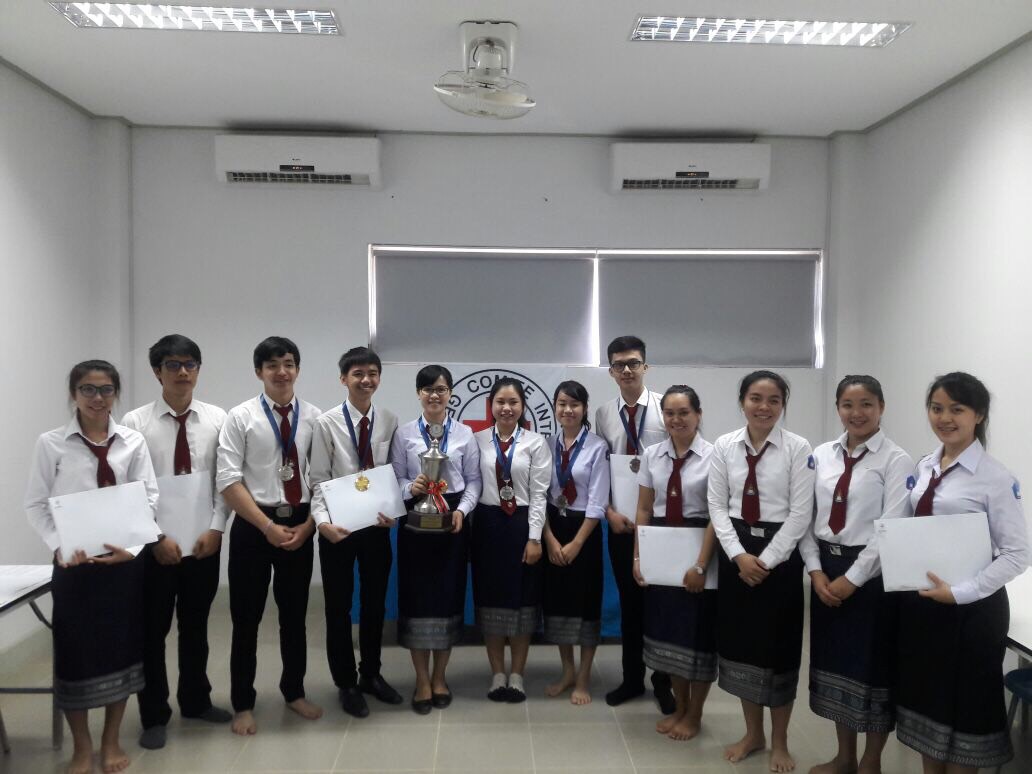
นักศึกษาที่เข้าร่วมการแข่งขันศาลจำลองในกฎหมายมนุษยธรรมระหว่างประเทศ รอบคัดเลือกตัวแทนประเทศ สปป ลาว ถ่ายภาพร่วมกันหลังเสร็จสิ้นการแข่งขัน
ICRC-น้องคิดว่ากฎหมายมนุษยธรรมระหว่างประเทศที่มีความสำคัญอย่างไร ทำไมเราจึงคารรู้เกี่ยวกับกฎหมายตัวนี้คะ
เทพมาลา-กฎหมายมนุษยธรรมระหว่างประเทศ (IHL) เป็นส่วนสำคัญในกฎหมายระหว่างประเทศที่รัฐต่างๆควรให้ความเคารพ มันเป็นกฎหมายที่มีไว้เพื่อให้ทุกฝ่ายคำนึงถึงหลักมนุษยธรรมและมีไว้เพื่อช่วยลดผลกระทบจากความขัดแย้งทางอาวุธอีกทั้งยังช่วยปกป้องบุคคลที่ไม่ได้มีส่วนร่วมกับการสู้รบอีกต่อไป นอกเหนือไปจากการปกป้องชีวิตแล้ว IHL ยังมีบทบาทสำคัญในการกำหนดให้มีการจ่ายค่าสินไหมทดแทนในกรณีเกิดความเสียหาย นั่นทำให้กฎหมายตัวนี้ได้รับการยอมรับและเคารพอย่างกว้างขวางไปทั่วโลก
ICRC-รู้สึกอย่างไรกับชัยชนะที่ได้รับและจะมีการเตรียมตัวไปแข่งขันที่ฮ่องกงอย่างไรบ้าง
เทพมาลา-ตอนที่ดิฉันเตรียมตัวสำหรับการแข่งขันครั้งนี้ บอกได้เลยว่ามันเป็นขั้นตอนที่ค่อนข้างยากเริ่มตั้งแต่การทำความเข้าใจตัวกฎหมายมนุษยธรรมระหว่างประเทศที่มีรายละเอียดเยอะ การเขียนคำร้องจนถึงวันแข่งขันซึ่งทำให้ดิฉันรู้สึกกดดันมาก แต่ผลที่ออกมาก็ทำให้ดิฉันคลายความสงสัยต่างๆนานาและรู้สึกภาคภูมิใจมากที่ได้เป็นผู้ชนะการแข่งขันศาลจำลองฯในรอบคัดเลือกตัวแทนประเทศครั้งนี้
ดิฉันอยากจะขอบคุณ ICRC ที่ทำให้ดิฉันได้รับโอกาสดีๆในครั้งนี้ แน่นอนว่าการแข่งขันครั้งนี้ทำให้ดิฉันมีความเข้าใจเกี่ยวกับการแข่งขันศาลจำลองฯมากขึ้น ดิฉันจะต้องเตรียมตัวให้มากขึ้นสำหรับการแข่งขันที่ฮ่องกง ต้องศึกษาตัวอย่างจากผู้ชนะการแข่งขันปีที่ผ่านๆมาและตัวอย่างคำร้องดีเด่น ที่สำคัญที่สุดคือการสร้างความเข้าใจเชิงลึกกับเอกสารทางกฎหมายที่เกี่ยวข้องกับการแข่งขัน
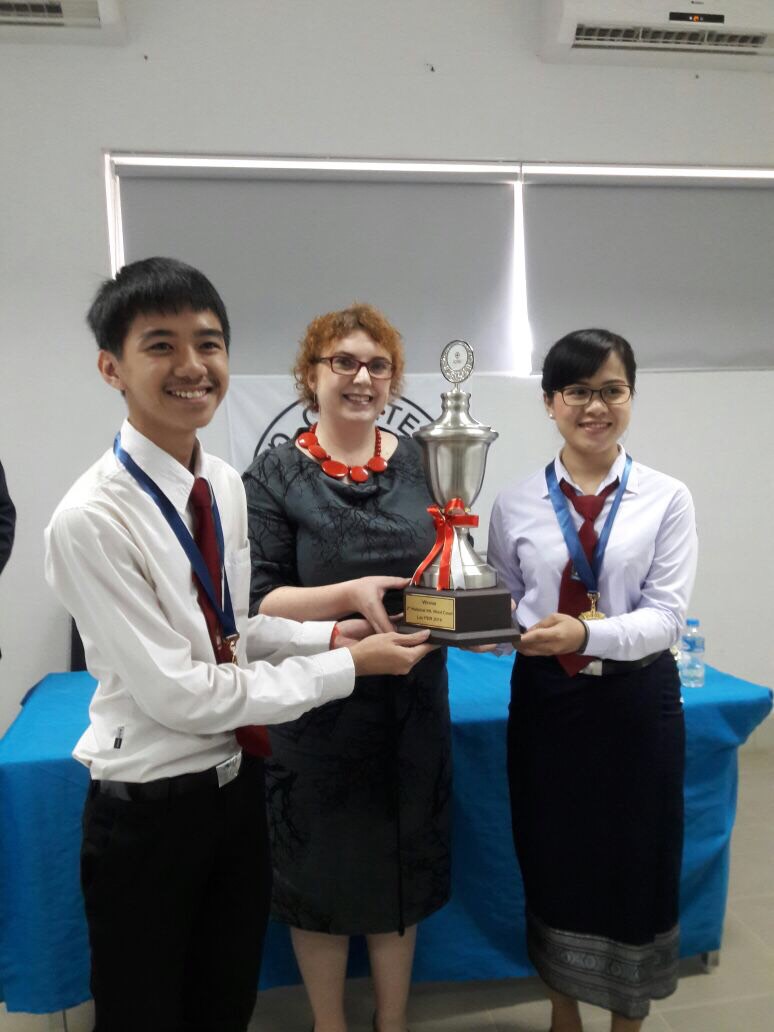
น้องเทพมาลา สะเด็ดตันและน้องทีละเดช สีวิไซย ผุ้ชนะการแข่งขันศาลจำลองฯจากสปป ลาว ถ่ายภาพร่วมกับคุณคาลิเซียน่า ธีนส์ กรรมการตัดสินจาก ICRC
ICRC-น้องจะแนะนำรุ่นน้องหรือเพื่อนๆเกี่ยวกับการแข่งขันศาลจำลองอย่างไรบ้างคะ
เทพมาลา-หลังเสร็จการแข่งขันครั้งนี้ ดิฉันจะสนับสนุนให้เพื่อนๆและนักศึกษาคนอื่นๆเข้าร่วมการแข่งขันศาลจำลองฯในปีต่อๆไป นอกจากนี้ดิฉันยังได้คุยกับเพื่อนๆที่สมาคมนักศึกษากฎหมายอาเซียน (ALSA) ว่าควรจะเอาการแข่งขันศาลจำลองฯเข้าไปบรรจุไว้ในกิจกรรมประจำปีของสมาคมเพื่อให้ทางสมาคมได้ช่วยฝึกฝนนักศึกษาให้มีความพร้อมสำหรับการแข่งขันศาลจำลองฯให้มากขึ้น
สามารถอ่านบทสัมภาษณ์ภาษาอังกฤษได้ที่นี่
ICRC-Could you please introduce yourself?
Thepmala- My name is Thepmala Sadettan, a 4th-vear international relations student Faculty of Law and Political Sciences, National University of Laos.
ICRC- What was your motivation to join International Humanitarian Law Moot Court competition?
Thepmala- I heard about IHL Moot Court Competition from my professor when I was a 2nd year student. The announcement has been made to all students in my faculty calling for participants to join the competition. At that time, I had no idea about what the moot court was then I decided not to go any further. In the following year, I could not make it either since the competition was unfortunately overlapped with the exchange program that I have applied. Nevertheless, this year I intentionally planned to apply for this competition and eventually I made it.
My three-year experience in ALSA (Asian Law Student’s Association) became the greatest inspiration that brought me here. I have been working, observing and that made me realized how hardly the students in my faculty are aware of the moot court apart from International Humanitarian Law. Therefore, I was highly motivated to take part in this competition in order to raise awareness within my community. My preparation was to read and understand cases, related laws and memorials from the previous competitions. In addition to that, I watched the competition from YouTube and practiced my speeches regularly.
ICRC- What do you think about learning and teaching International Humanitarian Law (IHL) in Lao PDR ?
Thepmala-Laos is a peaceful country. I can say that there is no conflict or warfare occurred. However, it can be apparently seen that many people are still unaware of IHL. IHL has only been implemented or applied in the educational systems in a few institutions throughout the country. Therefore, the general knowledge of IHL is considered to be quite low.
ICRC- How does IHL matter in today’s world?
Thepmala-IHL is an essential part of International Law which the states ought to respect. It attempts to ensure humanity practices in terms of lessening the effects of armed conflict and securely protect persons who are not and no longer take part in hostilities. Aside from the protection of lives, IHL plays a pivotal role to indemnify the destruction of properties in case of an occurrence of warfare. Therefore, these fundamental rules should be recognized and respected universally.
ICRC- How do you and your team prepare for the 15th ICRC Moot Court competition in Hong Kong?
Thepmala- When I was preparing for this competition, I could say that it was such a hard time along the way, starting from the first step to understand the concept of IHL consisting of many different types of laws and conventions. Following by the drafting process of memorials, and the mooting day was high-pressured and intense.
However, the result has taken away the doubtfulness. I was tremendously grateful to win this competition and I felt very honored to be awarded as the best mooter in National Round Competition. I am really thankful to the ICRC that provided me such an amazing opportunity to be part of this.
This National Round Competition provided me a clearer picture of moot court. In the upcoming competition in Hong Kong, I will prepare myself harder, to learn from those successful memorials and mooters. And most importantly, I will try to build an in-depth understanding with regard to the legal documents which would be useful for the competition.
ICRC-Will you encourage the junior students to join Moot Court Competition next year?
Thepmala-After this competition, I have been trying to encourage other students and peers to actively participate in the competition not only next year, but the years ahead. Furthermore, I have been discussed with my fellows from ALSA in Laos to incorporate Moot Court Competition in the annual plan of activities. The key objective is to train students from the faculty to be ready for upcoming competitions.



